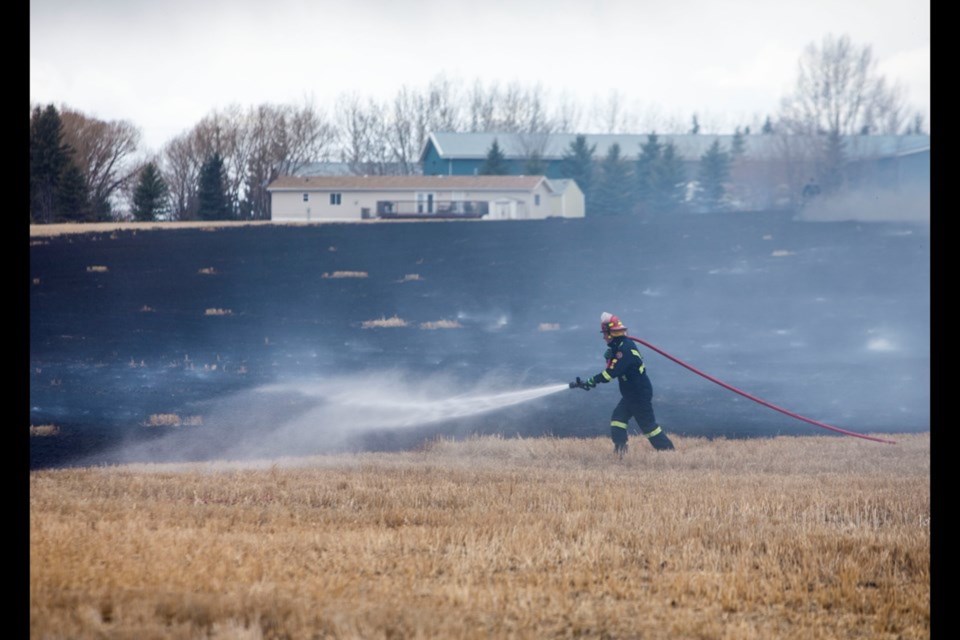Although the heatwave that's been gripping St. Albert and the surrounding area for the past week — with seemingly no signs of letting up — has created some serious risk, St. Albert's Fire Chief Everett Cooke says the significant rainfall this past spring was a key factor behind the lack of grass fires within city limits so far this year.
“Last year we did have a very active fire season with respect to outdoor fires — those are fires that happen in the grassland and brush areas around the city of St Albert — and unlike last year, we actually had a lot of moisture throughout our spring this year, which has really lowered the risk or the ability for a fire to start,” Cooke said in an interview.
“For our structure fires and fire calls, there haven't been any major structure fires in May or June or up to now in this part of July, and we've also noticed a significant decrease in those outdoor fires that we've been responding to as well.”
Cooke didn't say exactly how many grass fires St. Albert Fire Services has responded to in recent months, but up until mid-April there had been just two since wildfire season in Alberta was considered officially underway on March 1.
Besides the significant amount of spring rain that came down on St. Albert, which he said worked to dis-arm wildfire fuel such as dead leaves or loose twigs left over from fall, Cooke said he thought widespread fire awareness has played another major role.
“Not only locally but across the province there's a lot of awareness with regards to fire activity and behaviour,” he said. “Because of that I think residents of the province and of course our St. Albert residents are much more aware of safe burning activities and practices and those practices help reduce the risk of a wildfire starting.”
Continued heatwave leads to fire restriction order
On June 12, as a response to the extreme heat that had settled over the region and much of the province, the City of St. Albert issued a fire restriction, which prohibits the use of fire pits and barbecues located in public parks, burn barrels and incinerators in rural areas, and wood burning fire pits on driveways but not backyards.
READ MORE: St. Albert upgrades fire advisory to fire restriction
Cooke said the restriction will more than likely remain in place for at least the next week as St. Albert braces for more extreme heat, with the Weather Network forecasting daytime highs of 30 degrees C or more for at least seven straight days beginning on Wednesday, July 17.
“We did see some good moisture come through the area [over the weekend] but... we're moving into a week that's going to be averaging between 30 and 34 degrees C,” Cooke said. “We're going to be right back into those high, high risks within our region, so we're going to keep that restriction in place for the time being.”
“We're simply trying to take away or remove a few of the opportunities for a fire to get away from someone and then obviously start into a grass fire or into an event we don't want to deal with.”
Cooke said something to know when it comes to understanding just how substantial the risk of brush and grass fires is in St. Albert right now is that just 3.6 millimetres of rain fell on the city in the first two weeks of July, whereas normal rainfall for the same time period is around 40 millimetres.
“That is another contributing factor for us keeping the fire restriction in place for the time being.”
Cooke said St. Albert Fire Services and city administration will be monitoring the situation as the week goes on, as a total fire ban may be issued if the city receives an order from the province or if neighbouring municipalities also implement bans.
“As we work through the summer hopefully we don't get to a ban, and providing we have a significant amount of moisture, we'll hopefully be able to reduce the threat levels here over the over the next while.”
City reinstates extreme heat response
Given the extreme heat being forecast this week and into next, the City of St. Albert activated its extreme weather response on July 16.
The response measures, which are expected to stay in place until at least July 23, include city facilities operating as “cooling stations” where people can go to get out of the heat, public transit being available for free for those who need to get out of the sun, and RCMP officers having bottles of water available in their vehicles and at headquarters on Boudreau Road.
The city facilities open as cooling stations include St. Albert Place downtown, which is open from 7:00 a.m. to 11:00 p.m. Monday through Friday; Servus Place in Campbell Business Park, which is open from 5:30 a.m. to 9:30 p.m. Monday through Friday; and the Jensen Lakes Library, which is open from 12:00 p.m. to 6:00 p.m. on Tuesday and Wednesday, 12:00 p.m. to 8:00 p.m. on Thursday, and 10:00 a.m. to 6:00 p.m. on Friday.
The city says to avoid heat stroke or heat exhaustion, it's recommended that residents stay hydrated, avoid heavy exertion, wear sunscreen and dress for the weather, and try not use appliances that produce heat like stoves or ovens.
“Heat affects everyone differently,” reads the city's extreme heat notice. “The very aged and very young are more susceptible to heat so please keep an eye on friends, neighbours and family members.”
“Please take precautions to keep you and your family safe during extreme temperatures.”
The city's notice also says that those who are unhoused are facing greater risk of heat exhaustion and stroke, and if you're concerned about someone without shelter from the heat you can call the St. Albert Food Bank and Community Village at 780-459-0599 or the city's community services department at 780-459-1756.




